
Hadassah, The Women's Zionist Organization of America is an American Jewish volunteer women's organization. Founded in 1912 by Henrietta Szold, it is one of the largest international Jewish organizations, with nearly 300,000 members in the United States. Hadassah fundraises for community programs and health initiatives in Israel, including the Hadassah Medical Organization, two leading research hospitals in Jerusalem. In the US, the organization advocates on behalf of women's rights, religious autonomy and US–Israel diplomacy. In Israel, Hadassah supports health education and research, women's initiatives, schools and programs for underprivileged youth.

The Columbia University School of Social Work is the graduate school of social work of Columbia University in New York City. It is one of the oldest social work programs in the US, with roots extending back to 1898. It began awarding a Master of Science degree in 1940. As of 2018, it was one of the largest social work schools in the United States, with an enrollment of over 1,000 students.
Social exclusion or social marginalisation is the social disadvantage and relegation to the fringe of society. It is a term that has been used widely in Europe and was first used in France in the late 20th century. In the EU context, the European Commission defines it as "a situation whereby a person is prevented from contributing to and benefiting from economic and social progress". It is used across disciplines including education, sociology, psychology, healthcare, politics and economics.
Eliezer David Jaffe was an Israeli professor of social work specializing in philanthropy and non-profit management. He was Professor Emeritus at The Hebrew University's Paul Baerwald School of Social Work and Social Welfare.
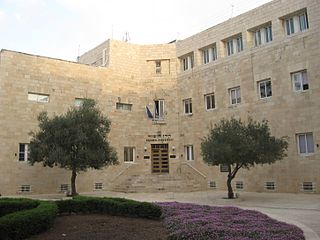
Keren Hayesod – United Israel Appeal is an official fundraising organization for Israel with branches in 45 countries. Its work is carried out in accordance with the Keren haYesod Law-5716, passed by the Knesset in January 1956, granting the organization a unique fundraising status. It is a registered corporation of the State of Israel.
Hand in Hand: Center for Jewish-Arab Education in Israel is a network of integrated, bilingual schools serving Jewish and Arab children in Israel. Hand in Hand was co-founded by Israeli Arab educator Amin Khalaf and Israeli-American educator Lee Gordon in 1997 with 50 students in two schools.
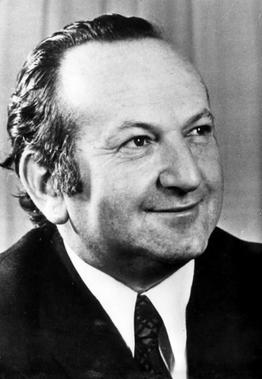
Yisrael Katz was an Israeli scholar, civil servant and politician who served as Minister of Labor and Social Affairs. He was one of the most influential people in Israel in the creation and development of the Israeli welfare state over several decades.

Society for the Protection of Nature in Israel, or SPNI, is an Israeli non-profit environmental organization working to preserve plants, animals, and natural environments that represent bio-diversity, by protecting the lands and waters needed for their survival, and is Israel's oldest and largest conservation organization.

The University of Haifa is a public research university located on Mount Carmel in Haifa, Israel. Founded in 1963, the University of Haifa received full academic accreditation in 1972, becoming Israel's sixth academic institution and the fourth university. The university has the largest university library in Israel. As of 2019, approximately 18,000 students were enrolled at the University of Haifa. Among Israeli higher education institutions the University of Haifa has the largest percentage (41%) of Arab-Israeli students.

The National Union of Israeli Students has been the representative body of students' throughout Israel since 1934. Today NUIS represents over 300,000 students in over 64 Universities and Colleges. The Student Union is determined to play a decisive role in Israeli Society and it has placed social impact on a national level as an organizational priority. The Student Union believes that beyond their role of acquiring knowledge, students have the ability and responsibility to build and shape the society they live in and make a considerable impact in the long term.

Uri Aviram is Zena Harman Professor Emeritus of Social Work at the Hebrew University of Jerusalem. In January 2016 he was appointed as the Dean of the School of social and community Sciences at Ruppin Academic Center in Israel. He retired in 2017, continuing research on mental health policy and services.
Human services is an interdisciplinary field of study with the objective of meeting human needs through an applied knowledge base, focusing on prevention as well as remediation of problems, and maintaining a commitment to improving the overall quality of life of service populations The process involves the study of social technologies, service technologies, and scientific innovations designed to ameliorate problems and enhance the quality of life of individuals, families and communities to improve the delivery of service with better coordination, accessibility and accountability. The mission of human services is to promote a practice that involves simultaneously working at all levels of society in the process of promoting the autonomy of individuals or groups, making informal or formal human services systems more efficient and effective, and advocating for positive social change within society.
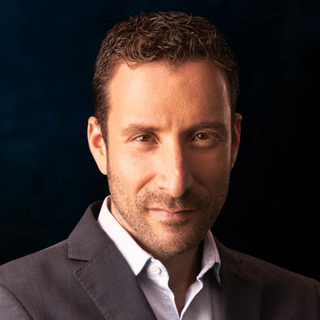
Yitzhak (Itzik) Shmuli is an Israeli politician who served as the Minister of Labor, Welfare and Social Services and as a Member of the Knesset on behalf of the Israeli Labor Party; formerly chairman of National Union of Israeli Students, and one of the leaders of the 2011 Israeli social justice protests. Shmuli currently serves as UJA-Federation of New York's Director-General in its Israel office.
BINA: The Jewish Movement for Social Change is a Jewish non-profit organization and educational institution that offers pluralistic programs and forums for adults and young adults seeking to explore their Jewish roots. It was founded in 1996, and has centers in Tel Aviv, Jerusalem, Haifa and Beer Sheva, Israel. BINA means "wisdom" in Hebrew and is an acronym for "A Home for the Creation of Our Nation's Souls", a phrase coined by Hebrew poet Chaim Nachman Bialik.
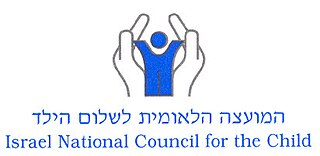
The Israel National Council for the Child in Jerusalem, Israel, is an Israeli independent non-profit non-governmental organization that advocates for children's rights and well-being. The organization serves all religions, ethnicities, and income levels in Israel.

Rivka Yahav is an academic psychotherapist, an academic faculty member of the School of Social Work, Head of the Psychotherapy Training Programme at Haifa University, and Head of the Interdisciplinary Clinical Center of the Faculty of Welfare and Health Sciences at Haifa University. She was awarded the Prime Minister’s Prize for Initiatives and Innovation in 2012.
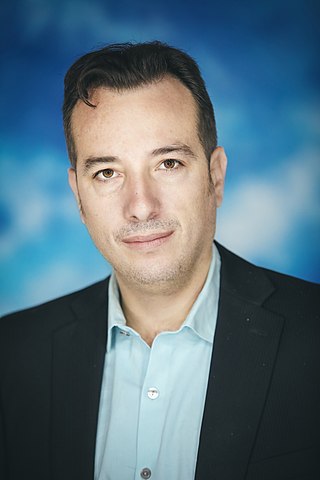
Ido Zelkovitz is an Israeli historian and researcher of the modern Middle East. His research focuses on cross-disciplinary analysis of the Palestinian History and Politics, the Arab-Israeli Conflict, Israel's geopolitical situation in the Middle East and the role of Higher Education and Students in Middle East politics.
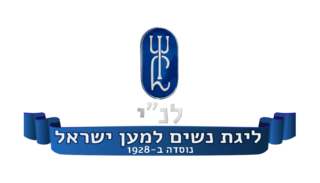
Women's League for Israel, is a volunteer organization dedicated to social welfare, education and Aliyah in Israel.

Michal Livia Krumer-Nevo is the David and Dorothy Schwartzman professor in Community Development at the Spitzer Department of Social Work and the honorary president of the Israeli Center for Qualitative Research of People and Societies, Ben-Gurion University of the Negev. Her scholarly activity covers issues of poverty, critical practice in social work, social injustice, Othering and qualitative methodologies. She developed the poverty-aware paradigm (PAP), a social justice framework for practice with people in poverty that has been widely implemented by the Welfare and Social Services Ministry in Israel.

Israel Elwyn (IE) (Hebrew: אלווין ישראל) is an Israeli nonprofit organization that provides services and programs for people with intellectual and developmental disabilities. It serves over 5,100 people from all age groups. The goal of the organization is to create a society in which people with disabilities have equal rights and can determine their own future and way of life. With the help of its programs, children and adults with disabilities gain the tools needed to lead more independent lives within the community.















